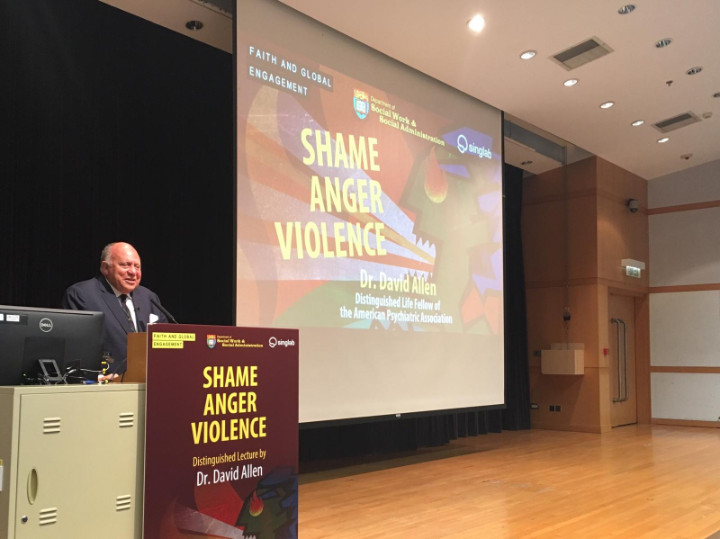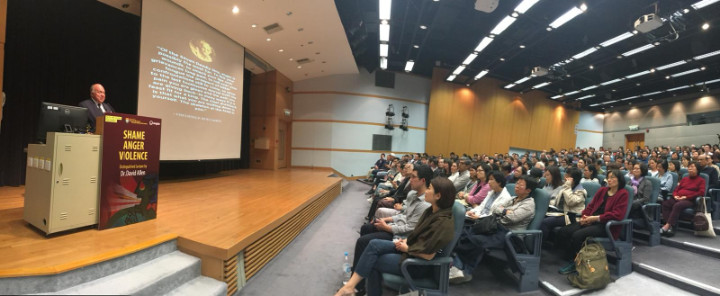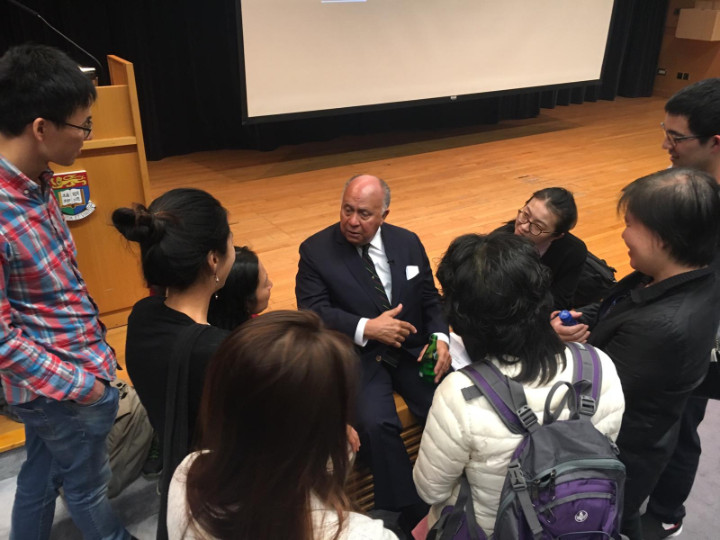|

|
 |
|
Last Updated: Apr 11, 2018 - 12:14:33 AM |

Dr. Allen, a Distinguished Life Fellow of the American Psychiatric Association, addresses hundreds at Hong Kong University, explaining the unique group therapy model ‘The Family’ extending the principles of group therapy to hundreds of hurt and hurting individuals every week. The work is supported by the Templeton World Charity Foundation.
|
Dr. David Allen was just a young boy when he first heard about messages from The Bahamas. In those days, the message came by way of a post card with a picture of a beach under shining sun, child shoveling sand into a bucket and the hastily-scribbled words, ‘Wish you were here.”
Today, the message from The Bahamas runs deeper, reaches further and the child who once played innocently in the sand with his whole life ahead of him is far too likely to end up a member of a gang, toting a gun instead of nurturing a dream.
It is a message that in the land of sun, sea and sand where decades of social fragmentation have taken their toll on society, a new kind of ‘Family’ is helping to rebuild lives and communities. The Family, a unique group therapy model involving hundreds of people scattered in community-based, non-threatening, family-like settings, is helping the broken to mend and the hardened to heal. In socio-medical terminology, it is resocialization intervention. In layman’s terms, it is people helping people by simply coming together without fear of reprisal, reprimand or judgement.

Hundreds pack the auditorium at Hong Kong University for a distinguished lecture by Bahamian Dr. David Allen, MD, MPH, on shame, anger and violence. Two weeks earlier, Dr. Allen delivered the prestigious Hochberg Lecture at the annual American Group Psychotherapy Association conference in Houston where more than 1,000 attended. The group therapy innovator whose work with The Family model is supported by the Templeton World Charity Foundation is an author, lecturer and practitioner.
|
It is a message of hope that respected clinical psychiatrist Dr. David Allen, MD, MPH, who developed the program with the support of the Templeton World Charity Foundation, is taking from his native Bahamas to campuses and auditoriums around the world, shining light on the stranglehold between shame, anger and violence and an innovative means to break that hold.
His words and his lectures are far more than theoretical. Dr. Allen has seen victims of abuse recover. With facilitators including daughter Dr. Marie Allen Carroll, clinical psychologist, he has helped to guide men and women hooked on drugs for decades to transform their lives. He has seen levels of anger subside and communities heal.
It is a message increasingly sought after as the local practitioner has become a thinker in demand on campuses and lecture halls from the medical capital of America to the Far East. In Dr. Allen’s latest academic publication in The International Journal of Group Psychotherapy, the editors describe his work as a new way of solving real world problems.

Dr. David Allen with graduate students at Hong Kong University following...
|
In late March, Dr. Allen addressed hundreds who packed the hall at Hong Kong University where students requested a second session, a smaller study group. Two weeks earlier, he delivered the Hochberg Lecture to more than 1,000 who attended the American Group Psychotherapy Association Annual Conference in Houston. He has taught at Harvard, Yale and Georgetown. In every talk, there is a singular thread – no matter how deep the divide or the social fragmentation, reintegration is possible. Just as the downward spiral into a tunnel of darkness occurs one step at a time, so the recovery is a step-by-step process of leaving the tunnel behind, emerging into the light.
“Shame begins to disseminate the moment the words start escaping,” he says, describing the healing aspects of sharing one’s story. “Every time the story sharing increases, the shame decreases. What is most personal is universal.”
The unique group therapy model developed by Dr. Allen is particularly well-suited for a country like The Bahamas where societal needs are great but there are few trained therapists and even fewer resources to cover the cost of therapy. There are 21 active Family groups in Nassau today with more than 400 participants who show up weekly at settings as disparate as the inner city and an affluent community. There are Families in the men’s and women’s prison, at a high school, a community centre, the Cancer Society and churches. Participation is free and the environment offers a warm, embracing, non-threatening feeling, as if a family were getting together to discuss what is on their minds, no matter how dark or hateful, hurtful or shameful it is. Each ‘Family’ session is led by a trained counselor, either a professional or someone who has undergone months of intense training. “While leaders are clearly leaders and facilitators in the group, they are also community members who exposed to similar trauma, violence and community fragmentation,” Dr. Allen explains. When they talk of abandonment, rejection, neglect or abuse, or when they mourn the loss of a loved one who was murdered, facilitators likely experienced similar trauma. But in the warmth of The Family, they begin to understand that shame can be shed and anger can be replaced, once it is released.
While group therapy is not new, The Family model is. Traditional groups consist of 8-10 participants. The Family can have 15-30 with equal or greater effectiveness, say various facilitators who have witnessed individuals discover strengths they did not know they possessed. And because they provide a resource for a large number of people, the impact reaches more of the population.
The community groups allow strangers to come together in a family-like setting to confront issues that usually start with two common themes -- shame and anger.
“Shame is a deep, hidden feeling produced by the shattering of cherished dreams, wishes and expectations,” explains Dr. Allen, a Distinguished Life Fellow of the American Psychiatric Association. The journey to what he calls the hurt trail and evil violence destructive tunnel occurs in stages and recognizable symptoms. Hurt, anger, sadness, shame, defensiveness, destructive rage precede violence and through awareness and confronting those realities, the individual who suffered can begin to heal, to find spirituality and purpose.
“The darkness of the tunnel of despair begins to lighten as those caught in its escalating downward spiral toward violence or resignation do one thing, they join others who admit their shame and begin to trust again through group therapy, people who may be strangers but who suffered many of the same hurts they did,” he explains. “Expressing anger and shame in a safe place can allow you to release those emotions and once you let go, you are able to live again. It is only when you carry the heavy burden of shame and anger that you become self-destructive or violent.”

© Copyright 2018 by thebahamasweekly.com
Top of Page
|
|
 |

|
